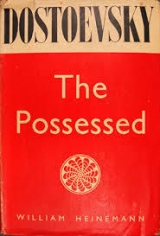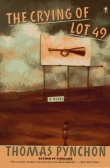
Текст книги "The Possessed"
Автор книги: Федор Достоевский
сообщить о нарушении
Текущая страница: 8 (всего у книги 49 страниц)
“Is that true?” said Stepan Trofimovitch, turning to Alexey Nilitch.
“I should prefer not to speak of it,” answered Alexey Nilitch, suddenly raising his head, and looking at him with flashing eyes. “I wish to contest your right to do this, Liputin. You've no right to drag me into this. I did not give my whole opinion at all. Though I knew Nikolay Stavrogin in Petersburg that was long ago, and though I've met him since I know him very little. I beg you to leave me out and . . . All this is something like scandal.”
Liputin threw up his hands with an air of oppressed innocence.
“A scandal-monger! Why not say a spy while you're about it? It's all very well for you, Alexey Nilitch, to criticise when you stand aloof from everything. But you wouldn't believe it, Stepan Trofimovitch – take Captain Lebyadkin, he is stupid enough, one may say ... in fact, one's ashamed to say how stupid he is; there is a Russian comparison, to signify the degree of it; and do you know he considers himself injured by Nikolay Vsyevolodovitch, though he is full of admiration for his wit. 'I'm amazed,' said he, 'at that man. He's a subtle serpent.' His own words. And I said to him (still under the influence of my conversation, and after I had spoken to Alexey Nilitch), 'What do you think, captain, is your subtle serpent mad or not?' Would you believe it, it was just as if I'd given him a sudden lash from behind. He simply leapt up from his seat. 'Yes,' said he, '. . . yes, only that,' he said, 'cannot affect . . .' 'Affect what?' He didn't finish. Yes, and then he fell to thinking so bitterly, thinking so much, that his drunkenness dropped off him. We were sitting in Filipov's restaurant. And it wasn't till half an hour later that he suddenly struck the table with his fist. 'Yes,' said he, 'maybe he's mad, but that can't affect it. . . .' Again he didn't say what it couldn't affect. Of course I'm only giving you an extract of the conversation, but one can understand the sense of it. You may ask whom you like, they all have the same idea in their heads, though it never entered anyone's head before. 'Yes,' they say, 'he's mad; he's very clever, but perhaps he's mad too.' “
Stepan Trofimovitch sat pondering, and thought intently.
“And how does Lebyadkin know?”
“Do you mind inquiring about that of Alexey Nilitch, who has just called me a spy? I'm a spy, yet I don't know, but Alexey Nilitch knows all the ins and outs of it, and holds his tongue.”
“I know nothing about it, or hardly anything,” answered the engineer with the same irritation. “You make Lebyadkin drank to find out. You brought me here to find out and to make me say. And so you must be a spy.”
“I haven't made him drunk yet, and he's not worth the money either, with all his secrets. They are not worth that to me. I don't know what they are to you. On the contrary, he is scattering the money, though twelve days ago he begged fifteen kopecks of me, and it's he treats me to champagne, not I him. But you've given me an idea, and if there should be occasion I will make him drunk, just to get to the bottom of it and maybe I shall find out . . . all your little secrets,” Liputin snapped back spitefully.
Stepan Trofimovitch looked in bewilderment at the two disputants. Both were giving themselves away, and what's more, were not standing on ceremony. The thought crossed my mind that Liputin had brought this Alexey Nilitch to us with the simple object of drawing him into a conversation through a third person for purposes of his own – his favourite manoauvre.
“Alexey Nilitch knows Nikolay Vsyevolodovitch quite well,” he went on, irritably, “only he conceals it. And as to your question about Captain Lebyadkin, he made his acquaintance before any of us did, six years ago in Petersburg, in that obscure, if one may so express it, epoch in the life of Nikolay Vsyevolodovitch, before he had dreamed of rejoicing our hearts by coming here. Our prince, one must conclude, surrounded himself with . rather a queer selection of acquaintances. It was at that time, it seems, that he made acquaintance with this gentleman here.”
“Take care, Liputin. I warn you, Nikolay Vsyevolodovitch meant to be here soon himself, and he knows how to defend himself.”
“Why warn me? I am the first to cry out that he is a man of the most subtle and refined intelligence, and I quite reassured Varvara Petrovna yesterday on that score. 'It's his character,' I said to her, 'that I can't answer for.' Lebyadkin said the same thing yesterday: 'A lot of harm has come to me from his character,' he said. Stepan Trofimovitch, it's all very well for you to cry out about slander and spying, and at the very time observe that you wring it all out of me, and with such immense curiosity too. Now, Varvara Petrovna went straight to the point yesterday. 'You have had a personal interest in the business,' she said, 'that's why I appeal to you.' I should say so! What need to look for motives when I've swallowed a personal insult from his excellency before the whole society of the place. I should think I have grounds to be interested, not merely for the sake of gossip. He shakes hands with you one day, and next day, for no earthly reason, he returns your hospitality by slapping you on the cheeks in the face of all decent society, if the fancy takes him, out of sheer wantonness. And what's more, the fair sex is everything for them, these butterflies and mettlesome-cocks! Grand gentlemen with little wings like the ancient cupids, lady-killing Petchorins! It's all very well for you, Stepan Trofimovitch, a confirmed bachelor, to talk like that, stick up for his excellency and call me a slanderer. But if you married a pretty young wife – as you're still such a fine fellow – then I dare say you'd bolt your door against our prince, and throw up barricades in your house! Why, if only that Mademoiselle Lebyadkin, who is thrashed with a whip, were not mad and bandy-legged, by Jove, I should fancy she was the victim of the passions of our general, and that it was from him that Captain Lebyadkin had suffered 'in his family dignity,' as he expresses it himself. Only perhaps that is inconsistent with his refined taste, though, indeed, even that's no hindrance to him. Every berry is worth picking if only he's in the mood for it. You talk of slander, but I'm not crying this aloud though the whole town is ringing with it; I only listen and assent. That's not prohibited.”
“The town's ringing with it? What's the town ringing with?”
“That is, Captain Lebyadkin is shouting for all the town to hear, and isn't that just the same as the market-place ringing with it? How am I to blame? I interest myself in it only among friends, for, after all, I consider myself among friends here.” He looked at us with an innocent air. “Something's happened, only consider: they say his excellency has sent three hundred roubles from Switzerland by a most honourable young lady, and, so to say, modest orphan, whom I have the honour of knowing, to be handed over to Captain Lebyadkin. And Lebyadkin, a little later, was told as an absolute fact also by a very honourable and therefore trustworthy person, I won't say whom, that not three hundred but a thousand roubles had been sent! . . . And so, Lebyadkin keeps crying out' the young lady has grabbed seven hundred roubles belonging to me,' and he's almost ready to call in the police; he threatens to, anyway, and he's making an uproar all over the town.”
“This is vile, vile of you!” cried the engineer, leaping up suddenly from his chair.
“But I say, you are yourself the honourable person who brought word to Lebyadkin from Nikolay Vsyevolodovitch that a thousand roubles were sent, not three hundred. Why, the captain told me so himself when he was drunk.”
“It's . . . it's an unhappy misunderstanding. Some one's made a mistake and it's led to ... It's nonsense, and it's base of you.”
“But I'm ready to believe that it's nonsense, and I'm distressed at the story, for, take it as you will, a girl of an honourable reputation is implicated first over the seven hundred roubles, and secondly in unmistakable intimacy with Nikolay Vsyevolodovitch. For how much does it mean to his excellency to disgrace a girl of good character, or put to shame another man's wife, like that incident with me? If he comes across a generous-hearted man he'll force him to cover the sins of others under the shelter of his honourable name. That's just what I had to put up with, I'm speaking of myself. . . .”
“Be careful, Liputin.” Stepan Trofimovitch got up from his easy chair and turned pale.
“Don't believe it, don't believe it! Somebody has made a mistake and Lebyadkin's drunk ...” exclaimed the engineer in indescribable excitement. “It will all be explained, but I can't. . . . And I think it's low. . . . And that's enough, enough!”
He ran out of the room.
“What are you about? Why, I'm going with you!” cried Liputin, startled. He jumped up and ran after Alexey Nilitch.
VII
Stepan Trofimovitch stood a moment reflecting, looked at me as though he did not see me, took up his hat and stick and walked quietly out of the room. I followed him again, as before. As we went out of the gate, noticing that I was accompanying him, he said:
“Oh yes, you may serve as a witness . . . de l'accident. Vous m'accompagnerez, riest-ce pas?”
“Stepan Trofimovitch, surely you're not going there again? Think what may come of it!”
With a pitiful and distracted smile, a smile of shame and utter despair, and at the same time of a sort of strange ecstasy, he whispered to me, standing still for an instant:
“I can't marry to cover 'another man's sins'!”
These words were just what I was expecting. At last that fatal sentence that he had kept hidden from me was uttered aloud, after a whole week of shuffling and pretence. I was positively enraged.
“And you, Stepan Verhovensky, with your luminous mind, your kind heart, can harbour such a dirty, such a low idea . . . and could before Liputin came!”
He looked at me, made no answer and walked on in the same direction. I did not want to be left behind. I wanted to give Varvara Petrovna my version. I could have forgiven him if he had simply with his womanish faint-heartedness believed Liputin, but now it was clear that he had thought of it all himself long before, and that Liputin had only confirmed his suspicions and poured oil on the flames. He had not hesitated to suspect the girl from the very first day, before he had any kind of grounds, even Liputin's words, to go upon. Varvara Petrovna's despotic behaviour he had explained to himself as due to her haste to cover up the aristocratic misdoings of her precious ''Nicolas” by marrying the girl to an honourable man! I longed for him to be punished for it.
“ Oh, Dieu, qui est si grand et si ban!Oh, who will comfort me!” he exclaimed, halting suddenly again, after walking a hundred paces.
“Come straight home and I'll make everything clear to you,” I cried, turning him by force towards home.
“It's he! Stepan Trofimovitch, it's you? You?” A fresh, joyous young voice rang out like music behind us.
We had seen nothing, but a lady on horseback suddenly made her appearance beside us – Lizaveta Nikolaevna with her invariable companion. She pulled up her horse.
“Come here, come here quickly!” she called to us, loudly and merrily. “It's twelve years since I've seen him, and I know him, while he. . . . Do you really not know me?”
Stepan Trofimovitch clasped the hand held out to him and kissed it reverently. He gazed at her as though he were praying and could not utter a word.
“He knows me, and is glad! Mavriky Nikolaevitch, he's delighted to see me! Why is it you haven't been to see us all this fortnight? Auntie tried to persuade me you were ill and must not be disturbed; but I know Auntie tells lies. I kept stamping and swearing at you, but I had made up my mind, quite made up my mind, that you should come to me first, that was why I didn't send to you. Heavens, why he hasn't changed a bit!” She scrutinised him, bending down from the saddle. “He's absurdly unchanged. Oh, yes, he has wrinkles, a lot of wrinkles, round his eyes and on his cheeks some grey hair, but his eyes are just the same. And have I changed? Have I changed? Why don't you say something?”
I remembered at that moment the story that she had been almost ill when she was taken away to Petersburg at eleven years old, and that she had cried during her illness and asked for Stepan Trofimovitch.
“You ... I ...” he faltered now in a voice breaking with joy. “I was just crying out 'who will comfort me?' and I heard your voice. I look on it as a miracle etje commence d croire.”
“En Dieu! En Dieu qui est la-haut et qui est si grand et si bon? You see, I know all your lectures by heart. Mavriky Nikolaevitch, what faith he used to preach to me then, en Dieu qui est si grand et si bon!And do you remember your story of how Columbus discovered America, and they all cried out, 'Land! land!'? My nurse Alyona Frolovna says I was light-headed at night afterwards, and kept crying out 'land! land!' in my sleep. And do you remember how you told me the story of Prince Hamlet? And do you remember how you described to me how the poor emigrants were transported from Europe to America? And it was all untrue; I found out afterwards how they were transited. But what beautiful fibs he used to tell me then, Mavriky Nikolaevitch! They were better than the truth. Why do you look at Mavriky Nikolaevitch like that? He is the best and “best man on the face of the globe and you must like him just you do me! Il fait tout ce que je veux.But, dear Stepan Trofimovitch, you must be unhappy again, since you cry out in the middle of the street asking who will comfort you. Unhappy, aren't you? Aren't you?”
“Now I'm happy. . . .”
“Aunt is horrid to you?” she went on, without listening. “She's just the same as ever, cross, unjust, and always our precious aunt! And do you remember how you threw yourself into my arms in the garden and I comforted you and cried – don't be afraid of Mavriky Nikolaevitch; he has known all about you, everything, for ever so long; you can weep on his shoulder as long as you like, and he'll stand there as long as you like! . . . Lift up your hat, take it off altogether for a minute, lift up your head, stand on tiptoe, I want to kiss you on the forehead as I kissed you for the last time when we parted. Do you see that young lady's admiring us out of the window? Come closer, closer! Heavens! How grey he is!”
And bending over in the saddle she kissed him on the forehead.
“Come, now to your home! I know where you live. I'll be with you directly, in a minute. I'll make you the first visit, you stubborn man, and then I must have you for a whole day at home. You can go and make ready for me.”
And she galloped off with her cavalier. We returned. Stepan Trofimovitch sat down on the sofa and began to cry.
“ Dieu, Dieu.'” he exclaimed, “ enftn une minute de bonheur!”
Not more than ten minutes afterwards she reappeared according to her promise, escorted by her Mavriky Nikolaevitch.
“ Vous et le bonheur, vous arrivez en meme temps!” He got up to meet her.
“Here's a nosegay for you; I rode just now to Madame Chevalier's, she has flowers all the winter for name-days. Here's Mavriky Nikolaevitch, please make friends. I wanted to bring you a cake instead of a nosegay, but Mavriky Nikolaevitch declares that is not in the Russian spirit.”
Mavriky Nikolaevitch was an artillery captain, a tall and handsome man of thirty-three, irreproachably correct in appearance, with an imposing and at first sight almost stern countenance, in spite of his wonderful and delicate kindness which no one could fail to perceive almost the first moment of making his acquaintance. He was taciturn, however, seemed very self-possessed and made no efforts to gain friends. Many of us said later that he was by no means clever; but this was not altogether just.
I won't attempt to describe the beauty of Lizaveta Nikolaevna. The whole town was talking of it, though some of our ladies and young girls indignantly differed on the subject. There were some among them who already detested her, and principally for her pride. The Drozdovs had scarcely begun to pay calls, which mortified them, though the real reason for the delay was Praskovya Ivanovna's invalid state. They detested her in the second place because she was a relative of the governor's wife, and thirdly because she rode out every day on horseback. We had never had young ladies who rode on horseback before; it was only natural that the appearance of Lizaveta Nikolaevna oh horseback and her neglect to pay calls was bound to offend local society. Yet every one knew that riding was prescribed her by the doctor's orders, and they talked sarcastically of her illness. She really was ill. What struck me at first sight in her was her abnormal, nervous, incessant restlessness. Alas, the poor girl was very unhappy, and everything was explained later. To-day, recalling the past, I should not say she was such a beauty as she seemed to me then. Perhaps she was really not pretty at all. Tall, slim, but strong and supple, she struck one by the irregularities of the lines of her face. Her eyes were set somewhat like a Kalmuck's, slanting; she was pale and thin in the face with high cheek-bones, but there was something in the face that conquered and fascinated! There was something powerful in the ardent glance of her dark eyes. She always made her appearance “like a Conquering heroine, and to spread her conquests.” She seemed proud and at times even arrogant. I don't know whether she succeeded in being kind, but I know that she wanted to, and made terrible efforts to force herself to be a little kind. There were, no doubt, many fine impulses and the very best elements in her character, but everything in her seemed perpetually seeking its balance and unable to find it; everything was in chaos, in agitation, in uneasiness. Perhaps the demands she made upon herself were too severe, and she was never able to find in herself the strength to satisfy them.
She sat on the sofa and looked round the room.
“Why do I always begin to feel sad at such moments; explain that mystery, you learned person? I've been thinking all my life that I should be goodness knows how pleased at seeing you and recalling everything, and here I somehow don't feel pleased at all, although I do love you. . . . Ach, heavens! He has my portrait on the wall! Give it here. I remember it! I remember it!”
An exquisite miniature in water-colour of Liza at twelve years old had been sent nine years before to Stepan Trofimovitch from Petersburg by the Drozdovs. He had kept it hanging on his wall ever since.
“Was I such a pretty child? Can that really have been my face?”
She stood up, and with the portrait in her hand looked in the looking-glass.
“Make haste, take it!” she cried, giving back the portrait. “Don't hang it up now, afterwards. I don't want to look at it.”
She sat down on the sofa again. “One life is over and another is begun, then that one is over – a third begins, and so on, endlessly. All the ends are snipped off as it were with scissors. See what stale things I'm telling you. Yet how much truth there is in them!”
She looked at me, smiling; she had glanced at me several times already, but in his excitement Stepan Trofimovitch forgot: that he had promised to introduce me.
“And why have you hung my portrait under those daggers? And why have you got so many daggers and sabres?”
He had as a fact hanging on the wall, I don't know why, two crossed daggers and above them a genuine Circassian sabre. As she asked this question she looked so directly at me that I wanted to answer, but hesitated to speak. Stepan Trofimovitch grasped the position at last and introduced me.
“I know, I know,” she said, “I'm delighted to meet you. Mother has heard a great deal about you, too. Let me introduce you to Mavriky Nikolaevitch too, he's a splendid person. I had formed a funny notion of you already. You're Stepan Trofimovitch's confidant, aren't you?”
I turned rather red.
“Ach, forgive me, please. I used quite the wrong word: not funny at all, but only . . .” She was confused and blushed. '' Why be ashamed though at your being a splendid person? Well, it's time we were going, Mavriky Nikolaevitch! Stepan Trofimovitch, you must be with us in half an hour. Mercy, what a lot we shall talk! Now I'm your confidante, and about everything, everything,you understand?”
Stepan Trofimovitch was alarmed at once.
“Oh, Mavriky Nikolaevitch knows everything, don't mind him!”
“What does he know?”
“Why, what do you mean?” she cried in astonishment. “Bah, why it's true then that they're hiding it! I wouldn't believe it! And they're hiding Dasha, too. Aunt wouldn't let me go in to see Dasha to-day. She says she's got a headache.”
“But . . . but how did you find out?”
“My goodness, like every one else. That needs no cunning!”
“But does every one else . . .?”
“Why, of course. Mother, it's true, heard it first through Alyona Frolovna, my nurse; your Nastasya ran round to tell her. You told Nastasya, didn't you? She says you told her yourself.”
“I ... I did once speak,” Stepan Trofimovitch faltered, crimsoning all over, “but ... I only hinted . . . j'etais si nerveux et malade, et puis...”
She laughed.
“And your confidant didn't happen to be at hand, and Nastasya turned up. Well that was enough! And the whole town's full of her cronies! Come, it doesn't matter, let them know; it's all the better. Make haste and come to us, we dine early. . . . Oh, I forgot,” she added, sitting down again; “listen, what sort of person is Shatov?”
“Shatov? He's the brother of Darya Pavlovna.”
“I know he's her brother! What a person you are, really,” she interrupted impatiently. “I want to know what he's like; what sort of man he is.”
“ C'est un pense-creux d'ici. C'est le meilleur et le plus irascible l'homme, du monde.”
“I've heard that he's rather queer. But that wasn't what I meant. I've heard that he knows three languages, one of them English, and can do literary work. In that case I've a lot of work for him. I want some one to help me and the sooner the better. Would he take the work or not? He's been recommended to me. ...”
“Oh, most certainly he will. Et vous ferez un bienfait. . . .”
“I'm not doing it as a bienfait.I need some one to help me.”
“I know Shatov pretty well,” I said, “and if you will trust me with a message to him I'll go to him this minute.”
“Tell him to come to me at twelve o'clock to-morrow morning. Capital! Thank you. Mavriky Nikolaevitch, are you ready?”
They went away. I ran at once, of course, to Shatov.
“ Man ami!” said Stepan Trofimovitch, overtaking me on the steps. “Be sure to be at my lodging at ten or eleven o'clock when I come back. Oh, I've acted very wrongly in my conduct to you and to every one.”
VIII
I did not find Shatov at home. I ran round again, two hours later. He was still out. At last, at eight o'clock I went to him again, meaning to leave a note if I did not find him; again I failed to find him. His lodging was shut up, and he lived alone without a servant of any sort. I did think of knocking at Captain Lebyadkin's down below to ask about Shatov; but it was all shut up below, too, and there was no sound or light as though the place were empty. I passed by Lebyadkin's door with curiosity, remembering the stories I had heard that day. Finally, I made up my mind to come very early next morning: To tell the truth I did not put much confidence in the effect of a note. Shatov might take no notice of it; he was so obstinate and shy. Cursing my want of success, I was going out of the gate when all at once I stumbled on Mr. Kirillov. He was going into the house and he recognised me first. As he began questioning me of himself, I told him how things were, and that I had a note.
“Let us go in,” said he, “I will do everything.”
I remembered that Liputin had told us hp had taken the wooden lodge in the yard that morning. In the lodge, which was too large for him, a deaf old woman who waited upon him was living too. The owner of the house had moved into a new house in another street, where he kept a restaurant, and this old woman, a relation of his, I believe, was left behind to look after everything in the old house. The rooms in the lodge were fairly clean, though the wall-papers were dirty. In the one we went into the furniture was of different sorts, picked up here and there, and all utterly worthless. There were two card-tables, a chest of drawers made of elder, a big deal table that must have come from some peasant hut or kitchen, chairs and a sofa with trellis-work back and hard leather cushions. In one corner there was an old-fashioned ikon, in front of which the old woman had lighted a lamp before we came in, and on the walls hung two dingy oil-paintings, one, a portrait of the Tsar Nikolas I, painted apparently between 1820 and 1830; the other the portrait of some bishop. Mr. Kirillov lighted a candle and took out of his trunk, which stood not yet unpacked in a corner, an envelope, sealing-wax, and a glass seal.
“Seal your note and address the envelope.”
I would have objected that this was unnecessary, but he insisted. When I had addressed the envelope I took my cap.
“I was thinking you'd have tea,” he said. “I have bought tea. Will you?”
I could not refuse. The old woman soon brought in the tea, that is, a very large tea-pot of boiling water, a little tea-pot full of strong tea, two large earthenware cups, coarsely decorated, a fancy loaf, and a whole deep saucer of lump sugar.
“I love tea at night,” said he. “I walk much and drink it till daybreak. Abroad tea at night is inconvenient.”
“You go to bed at daybreak?”
“Always; for a long while. I eat little; always tea. Liputin's sly, but impatient.”
I was surprised at his wanting to talk; I made up my mind to take advantage of the opportunity. “There were unpleasant misunderstandings this morning,” I observed.
He scowled.
“That's foolishness; that's great nonsense. All this is nonsense because Lebyadkin is drunk. I did not tell Liputin, but only explained the nonsense, because he got it all wrong. Liputin has a great deal of fantasy, he built up a mountain out of nonsense. I trusted Liputin yesterday.”
“And me to-day?” I said, laughing.
“But you see, you knew all about it already this morning; Liputin is weak or impatient, or malicious or ... he's envious.”
The last word struck me.
“You've mentioned so many adjectives, however, that it would be strange if one didn't describe him.”
“Or all at once.”
“Yes, and that's what Liputin really is – he's a chaos. He was lying this morning when he said you were writing something, wasn't he?
“Why should he?” he said, scowling again and staring at the floor.
I apologised, and began assuring him that I was not inquisitive. He flushed.
“He told the truth; I am writing. Only that's no matter.”
We were silent for a minute. He suddenly smiled with the childlike smile I had noticed that morning.
“He invented that about heads himself out of a book, and told me first himself, and understands badly. But I only seek the causes why men dare not kill themselves; that's all. And it's all no matter.”
“How do you mean they don't dare? Are there so few suicides?”
“Very few.”
“Do you really think so?”
He made no answer, got up, and began walking to and fro lost in thought.
“What is it restrains people from suicide, do you think?” I asked.
He looked at me absent-mindedly, as though trying to remember what we were talking about.
“I . . . I don't know much yet. . . . Two prejudices restrain them, two things; only two, one very little, the other very big.”
“What is the little thing?”
“Pain.”
“Pain? Can that be of importance at such a moment?”
“Of the greatest. There are two sorts: those who kill themselves either from great sorrow or from spite, or being mad, or no matter what . . . they do it suddenly. They think little about the pain, but kill themselves suddenly. But some do it from reason – they think a great deal.”
“Why, are there people who do it from reason?”
“Very many. If it were not for superstition there would be more, very many, all.”
“What, all?”
He did not answer.
“But aren't there means of dying without pain?”
“Imagine”– he stopped before me —“ imagine a stone as big as a great house; it hangs and you are under it; if it falls on you, on your head, will it hurt you?”
“A stone as big as a house? Of course it would be fearful.”
“I speak not of the fear. Will it hurt?”
“A stone as big as a mountain, weighing millions of tons? Of course it wouldn't hurt.”
“But really stand there and while it hangs you will fear very much that it will hurt. The most learned man, the greatest doctor, all, all will be very much frightened. Every one will know that it won't hurt, and every one will be afraid that it will hurt.”
“Well, and the second cause, the big one?”
“The other world!”
“You mean punishment?”
“That's no matter. The other world; only the other world.”
“Are there no atheists, such as don't believe in the other world at all?”
Again he did not answer.
“You judge from yourself, perhaps.”
“Every one cannot judge except from himself,” he said, reddening. “There will be full freedom when it will be just the same to live or not to live. That's the goal for all.”
“The goal? But perhaps no one will care to live then?”
“No one,” he pronounced with decision.
“Man fears death because he loves life. That's how I understand it,” I observed, “and that's determined by nature.”
“That's abject; and that's where the deception comes in.” His eyes flashed. “Life is pain, life is terror, and man is unhappy. Now all is pain and terror. Now man loves life, because he loves pain and terror, and so they have done according. Life is given now for pain and terror, and that's the deception. Now man is not yet what he will be. There will be a new man, happy and proud. For whom it will be the same to live or not to live, he will be the new man. He who will conquer pain and terror will himself be a god. And this God will not be.”








